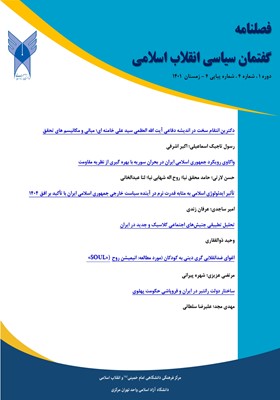واکاوی رویکرد جمهوری اسلامی ایران در بحران سوریه با بهره گیری از نظریه مقاومت
محورهای موضوعی : فلسفه سیاسی انقلاب اسلامیحسن لارتی 1 , حامد محقق نیا 2 , روح اله شهابی نیا 3 , لنا عبدالخانی 4
1 - گروه علوم سیاسی، واحد بین المللی خرمشهر، دانشگاه آزاد اسلامی، خرمشهر، ایران.
2 - گروه علوم سیاسی، واحد اهواز، دانشگاه آزاد اسلامی، اهواز، ایران.
3 - گروه علوم سیاسی، واحد اهواز، دانشگاه آزاد اسلامی، اهواز، ایران.
4 - گروه علوم سیاسی، واحد اهواز، دانشگاه آزاد اسلامی، اهواز، ایران.
کلید واژه: جمهوری اسلامی ایران, بحران سوریه, همگرایی, نظریه مقاومت, محور مقاومت,
چکیده مقاله :
بحران سوریه که ابتدا با اعتراضات مردمی شروع و در ادامه به جنگ داخلی و تقابل مخالفان مسلح و گروه های تروریستی با حکومت بشار اسد منجر شد، بازیگران متعددی را هم درگیر این منازعه کرد. برخی کشورها به حمایت از مخالفان بشار اسد برخاستند و برای سرنگونی نظام حاکم همه مساعی خود را به کار بستند. بازیگرانی هم بودند که در جهت حمایت و بقای حکومت بشار اسد قدم برداشتند. جمهوری اسلامی ایران، یکی از بازیگران شاخص این جبهه بود که با ورودش به صحنه منازعه، نقشی کلیدی و انکارناپذیر در تغییر شرایط جنگ داشت. این تحقیق هم بر این مبنا پایه گذاری شده که چرا جمهوری اسلامی ایران مشارکتی مستقیم در جنگ سوریه داشت و چه نظریه ای می تواند این مشارکت را تشریح و تحلیل کند؟ برای پاسخ به این پرسش ها، باید رویکرد ایران بعد از انقلاب اسلامی را بررسی کرد. رویکردی که براساس مقاومت، نفی نظام سلطه، بازدارندگی، مبارزه با رژیم صهیونیستی، حمایت از جنبش های آزادیبخش و افزایش نفوذ و قدرت منطقه ای بنا شده است. بنابراین با تشدید منازعه و جنگ در سوریه، جمهوری اسلامی ایران که نابودی نظام سوریه را به معنای تضعیف و از هم گسیختگی محور مقاومت، کاهش توان بازدارندگی و قدرت منطقه ای خود می دانست،با محاسبه اشتراکات ایدئولوژیک، ژئوپلتیک و استراتژیک میان خود و نظام سوریه، مشارکتی فعال و تعیین کننده در بحران داشت و زمینه بقای نظام اسد و اتحاد راهبردی خود با سوریه را فراهم کرد.
The conflict in Syria, which first started with popular protests and then led to a civil war and the confrontation of armed opposition and terrorist groups with Bashar al-Assad's government, involved many actors in this conflict. Some countries supported the opposition of Bashar al-Assad and made every effort to overthrow the ruling system. There were actors who took a step towards the support and survival of Bashar al-Assad's government. The Islamic Republic of Iran was one of the leading actors of this front, which, upon entering the conflict scene, played a key and undeniable role in changing the conditions of the war. This research is based on the basis of why the Islamic Republic of Iran had a direct participation in the Syrian war and what theory can explain and analyze this participation? To answer these questions, Iran's approach after the Islamic Revolution should be examined. An approach that is based on resistance, negation of the domination system, deterrence, fighting against the Zionist regime, supporting liberation movements and increasing regional influence and power. Therefore, with the escalation of the conflict and war in Syria, the Islamic Republic of Iran, which considered the destruction of the Syrian regime to mean the weakening and disintegration of the axis of resistance, the reduction of its deterrent power and regional power, by calculating the ideological, geopolitical and strategic commonalities between itself and the regime Syria had an active and decisive participation in the crisis and provided the basis for the survival of the Assad regime and its strategic alliance with Syria.
_||_


